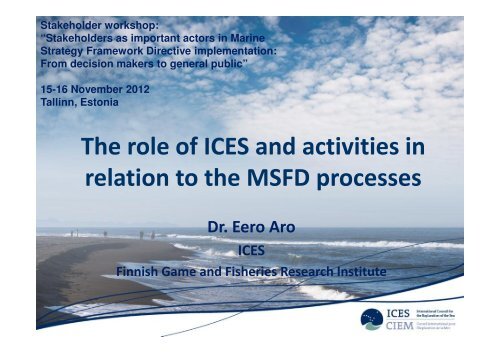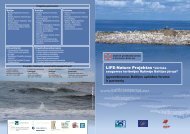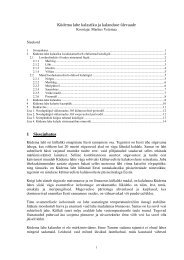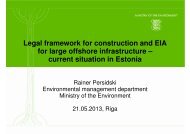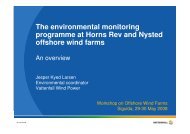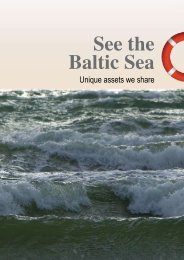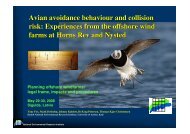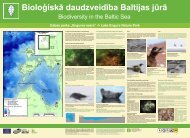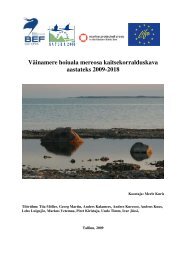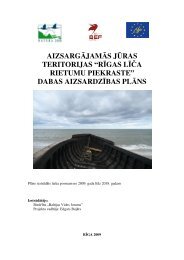16_ICES and MSFD E_Aro - Marmoni
16_ICES and MSFD E_Aro - Marmoni
16_ICES and MSFD E_Aro - Marmoni
Create successful ePaper yourself
Turn your PDF publications into a flip-book with our unique Google optimized e-Paper software.
Stakeholder workshop:<br />
“Stakeholders as important actors in Marine<br />
Strategy Framework Directive implementation:<br />
From decision makers to general public”<br />
15-<strong>16</strong> November 2012<br />
Tallinn, Estonia<br />
The role of <strong>ICES</strong> <strong>and</strong> activities in<br />
relation to the <strong>MSFD</strong> processes<br />
Dr. Eero <strong>Aro</strong><br />
<strong>ICES</strong><br />
Finnish Game <strong>and</strong> Fisheries Research Institute
What have we done so far?<br />
• <strong>ICES</strong> has contributed throughout the <strong>MSFD</strong> development <strong>and</strong><br />
implementation process by creating <strong>and</strong> managing task groups in<br />
cooperation with the Joint Research Center (JRC) 2008-2009.<br />
• Task groups provided the background information for the<br />
Commission Decision on criteria <strong>and</strong> methodological st<strong>and</strong>ards<br />
on good environmental status of marine waters (2010/477/EU).<br />
• <strong>ICES</strong> provided guidance to the implementation of Descriptor 3+<br />
(commercially exploited fish <strong>and</strong> shellfish) (2011)<br />
• In 2011, <strong>ICES</strong> Council established the Council Steering Group on<br />
the Marine Strategy Framework Directive to consider:<br />
“How to help <strong>ICES</strong> member countries to implement <strong>MSFD</strong>?”
Descriptors:<br />
1. Biological Diversity<br />
2. Non-indigenous<br />
Species<br />
3. Commercially<br />
Exploited Fish <strong>and</strong><br />
Shellfish Populations<br />
4. Food Webs<br />
5. Eutrophication<br />
6. Seafloor Integrity<br />
7. Alterations of<br />
Hydrographical<br />
Conditions<br />
8. Contaminants <strong>and</strong><br />
Pollution Effects<br />
9. Contaminants in Fish<br />
<strong>and</strong> other Seafood<br />
10.Litter<br />
11.Energy <strong>and</strong> Noise<br />
50°N<br />
40°N<br />
30°N<br />
20°N<br />
20°W<br />
10°W<br />
0°<br />
10°E<br />
Regional Seas around Europe<br />
Baltic Sea<br />
North-east Atlantic Ocean<br />
Icel<strong>and</strong> Sea<br />
Norwegian Sea<br />
Barents Sea<br />
Greater North Sea, incl. the Kattegat <strong>and</strong> the English Channel<br />
Celtic Seas<br />
Bay of Biscay <strong>and</strong> the Iberian Coast<br />
Macaronesia<br />
Mediterranean Sea<br />
Western Mediterranean Sea<br />
Adriatic Sea<br />
Ionian Sea <strong>and</strong> the Central Mediterranean Sea<br />
Aegian-Levantine Sea<br />
20°E<br />
30°E<br />
Black Sea
What next <strong>and</strong> what are<br />
our resources <strong>and</strong><br />
vehicles?<br />
• <strong>ICES</strong> has 20 member<br />
countries:<br />
Belgium, Canada, Denmark,<br />
Estonia, Finl<strong>and</strong>, France, Germany,<br />
Icel<strong>and</strong>, Irel<strong>and</strong>, Latvia, Lithuania,<br />
the Netherl<strong>and</strong>s, Norway, Pol<strong>and</strong>,<br />
Portugal, Russia, Spain, Sweden,<br />
United Kingdom, <strong>and</strong> the United<br />
States of America.<br />
• <strong>ICES</strong> comprises a network of<br />
more than 4000 scientists from<br />
almost 300 institutes, with about<br />
<strong>16</strong>00 scientists participating<br />
regularly in <strong>ICES</strong> working groups.
Council Steering Group on <strong>MSFD</strong> 2012<br />
• Gerd Kraus (Chair, <strong>ICES</strong> Delegate, Germany)<br />
• Bill Turrell (<strong>ICES</strong> Delegate, UK)<br />
• Carlos Vale (<strong>ICES</strong> Delegate, Portugal)<br />
• Pierre Petitgas (<strong>ICES</strong> Delegate, France)<br />
<strong>ICES</strong> Delegates<br />
• Anne Christine Brusendorff (<strong>ICES</strong> General Secretary)<br />
• Claus Hagebro (<strong>ICES</strong> Secretariat)<br />
<strong>ICES</strong> Secretariat<br />
• David Connor (EU-DG-ENV)<br />
EU-COM DGENV<br />
• Wera Leujak (German National Environmental Agency)<br />
• Eugene Nixon (ACOM/SCICOM MFSD SG)<br />
• Yvonne Walther (ACOM/SCICOM MFSD SG)<br />
Expert scientists<br />
• Joachim Raben Levetzau (Danish Nature Agency)<br />
• Kim Raegaard (Danish Ministry of Food, Agriculture <strong>and</strong> Fisheries)<br />
National<br />
<strong>ICES</strong> Clients
Output from Council Steering Group on <strong>MSFD</strong><br />
How to help member countries ?<br />
EU Marine Strategy Framework<br />
Directive<br />
1. Initial Assessment<br />
2. Good Environmental Status<br />
2.a Indicators<br />
2.b Environmental targets<br />
3. Monitoring programmes<br />
4. Programmes of measures<br />
<strong>ICES</strong> contribution <strong>and</strong> activity<br />
Scientific development, benchmarking <strong>and</strong><br />
operationalization of integrated ecosystem<br />
assessments (IEAs)<br />
Operational <strong>and</strong> concept review, including<br />
development <strong>and</strong> test of new assessment<br />
methodologies.<br />
Review of existing indicators, <strong>and</strong> selection <strong>and</strong><br />
development of new integrated CFP <strong>and</strong> <strong>MSFD</strong><br />
indicators.<br />
Development of methodologies to facilitate target<br />
setting <strong>and</strong> evaluation.<br />
Coordination of international monitoring<br />
programmes for fish stocks <strong>and</strong> ecosystems.<br />
Development of monitoring guidelines,<br />
programmes, <strong>and</strong> integrated ecosystem surveys.<br />
Development of management strategy evaluation<br />
tools for simulation of management measures <strong>and</strong><br />
review of proposed measures.
Output from Council Steering Group on <strong>MSFD</strong><br />
How to help member countries ?<br />
EU Marine Strategy Framework Directive <strong>ICES</strong> contribution <strong>and</strong> activity<br />
5. Marine spatial panning, including marine<br />
protected areas<br />
6. Interregional co-operation<br />
Contributions to the development of next<br />
generation ecosystem-based marine spatial<br />
planning. Identification <strong>and</strong> review of<br />
vulnerable marine ecosystems (VMEs),<br />
proposed Marine Protected Areas (MPAs <strong>and</strong><br />
ecologically <strong>and</strong> biologically significant areas<br />
(EBSAs).<br />
Supporting compatibility <strong>and</strong> coherence<br />
between regions.<br />
7. Data h<strong>and</strong>ling, dissemination, <strong>and</strong> display Provision of databases <strong>and</strong> related services<br />
8. Training<br />
9. Networking<br />
Provision of tailor made <strong>MSFD</strong> relevant<br />
training.<br />
Sponsoring science symposia <strong>and</strong><br />
conferences, <strong>and</strong> participation in external<br />
projects towards development, stimulation<br />
<strong>and</strong> synthesis of relevant science.<br />
Strengthening cooperative science<br />
approaches.
What has happened in 2012?<br />
Overview of <strong>MSFD</strong> relevant activities in<br />
<strong>ICES</strong> during 2012<br />
Symposia: Research <strong>and</strong> ecosystem-based management strategies<br />
supporting the implementation of the Marine Strategy Framework Directive<br />
(Marine Strategy 2012), 13-15 May 2012, Copenhagen, Denmark.<br />
ASC 2012 Theme Session in Bergen Norway 17-<br />
22.09.2012: Implementation of the European Union Marine Strategy<br />
Framework Directive (EU <strong>MSFD</strong>): Implications for science <strong>and</strong> policy.<br />
1. National approaches <strong>and</strong> outcomes of the initial assessments<br />
2. Targets <strong>and</strong> indicators developed to assess Good Environmental Status<br />
3. Approaches to integrate assessments across indicators <strong>and</strong> descriptors<br />
4. Coordination of approaches to implementation across marine regions<br />
5. Progress on the development of monitoring programmes to assess GES<br />
6. Assessments of the costs <strong>and</strong> benefits of implementation of the <strong>MSFD</strong>
What has happened in 2012?<br />
Overview of <strong>MSFD</strong> relevant<br />
activities in <strong>ICES</strong> during 2012<br />
Expert group under ACOM:<br />
1.The Working Group on the Ecosystem Effects of Fishing<br />
Activities (WGECO), Copenhagen, Denmark, 11–18 April<br />
2012.<br />
2.Stock assessment WGs (many) <strong>and</strong> SGs, integrated<br />
assessment WGs, multispecies assessment WGs, methods<br />
WGs etc. to evaluate the state of the stocks in <strong>ICES</strong> area<br />
(in total In 2012 <strong>ICES</strong> has so far provided fisheries advice on<br />
more than 240 stocks)
What has happened in 2012?<br />
Expert groups under SCICOM:<br />
1. The Working Group on Biodiversity Science<br />
(WGBIODIV), Nantes, France, 30 January–3 February<br />
2012.<br />
2. The Joint DFO, KnowSeas <strong>and</strong> <strong>ICES</strong> Workshop: Quality<br />
assurance of scientific <strong>and</strong> integrated management<br />
processes for use in marine planning <strong>and</strong> coastal zone<br />
management (WKQAMSP), Halifax, Canada, 28 February<br />
to 1 March 2012.<br />
3. The Working Group on Biological Effects of<br />
Contaminants (WGBEC), Porto, Portugal, 12–<strong>16</strong> March<br />
2012 The Marine Chemistry Working Group (MCWG),<br />
Southampton, UK, 20–24 February 2012.<br />
4. The <strong>ICES</strong>-IOC Working Group on Harmful Algal Bloom<br />
Dynamics (WGHABD) Oban, Scotl<strong>and</strong>, UK, 24–27 April<br />
2012.<br />
5. The International Bottom Trawl Survey Working Group<br />
(IBTSWG), Lorient, France, 27–30 March 2012.
What has happened in 2012?<br />
Expert groups under SCICOM:<br />
6. The Working Group on Ecosystem Assessment of<br />
Western European Shelf Seas (WGEAWESS) Lisbon,<br />
Portugal, 24–27 April 2012.<br />
7. The Working Group on Marine Habitat Mapping<br />
(WGMHM), Isle of Vilm, Germany, 22–25 May 2012.<br />
8. The Working Group on Oceanic Hydrography (WGOH),<br />
<strong>ICES</strong> Headquarters, Copenhagen, Denmark, 20–22 March<br />
2012.<br />
9. The Working Group on Fisheries Acoustics, Science <strong>and</strong><br />
Technology (WGFAST), Brest, France, 23–27 April 2012.<br />
10.The Working Group on Multispecies Assessment<br />
Methods (WGSAM) Venice, Italy, 22–26 October 2012 .<br />
11.A joint SCICOM <strong>and</strong> ACOM Strategic Initiative on<br />
Biodiversity Science <strong>and</strong> Advice (SIBAS) was established<br />
in order to ensure that <strong>ICES</strong> develops <strong>and</strong> promotes the<br />
linkage of marine biodiversity science <strong>and</strong> advice.
For 2013 <strong>and</strong> beyond<br />
Action points:<br />
1. DRAFT Overview of <strong>ICES</strong> work in relation to <strong>MSFD</strong>:<br />
Report available soon (November-December 2012)<br />
2. Monitoring – integrated surveys<br />
a) Develop a white paper on integration of fishieries <strong>and</strong><br />
environmental surveys<br />
b) Stimulate a discussion in <strong>ICES</strong> leadership on a substantial<br />
review of coordinated surveys<br />
c) Develop concrete proposals for integrated surveys, e.g.<br />
IBTS, BITS to address an call by DG-ENV (New Knowledge<br />
for an integrated management of human activity in the<br />
sea)
For 2013 <strong>and</strong> beyond<br />
Action points:<br />
3. Data h<strong>and</strong>ling <strong>and</strong> model tools<br />
a) Develop an unsolicited offer to member states <strong>and</strong> make<br />
this part of the <strong>ICES</strong> communication <strong>and</strong> outreach<br />
strategy<br />
4. Communication <strong>and</strong> outreach strategy<br />
a) Secretariat to elaborate communication <strong>and</strong> outreach<br />
material that highlights the <strong>ICES</strong> portfolio.<br />
b) Portfolio highlighted at meetings with recipients of <strong>ICES</strong><br />
ADVICE<br />
c) Common symposium with RSC in 2013 ??<br />
5. Training<br />
TG was asked to develop <strong>and</strong> highlight MFSD relevant courses<br />
(e.g., design of monitoring programmes, indicator <strong>and</strong> risk<br />
assessments)
For 2013 <strong>and</strong> beyond<br />
Action points:<br />
5. <strong>ICES</strong> training courses in 2013<br />
1. Stock Assessment (Introduction), 27-31 May 2013, Centro<br />
Oceanográfico de Vigo, Spain. Read more. Registration<br />
deadline: 5 April 2013. Course with EU Marine Strategy<br />
Framework Directive relevance.<br />
2. Fisheries Management to meet Biodiversity Conservation<br />
needs, 18–20 June 2013, <strong>ICES</strong> HQ, Copenhagen, Denmark.<br />
Read more. Registration deadline: 26 April 2013. Course with<br />
EU Marine Strategy Framework Directive relevance.<br />
3. Ecosystem Modelling for Fishery Management, 26-30 August<br />
2013, <strong>ICES</strong> HQ, Copenhagen, Denmark. Read more.<br />
Registration deadline: 7 June 2013. Course with EU Marine<br />
Strategy Framework Directive relevance.
For 2013 <strong>and</strong> beyond<br />
Action points:<br />
5. <strong>ICES</strong> training courses in 2013<br />
4. Trawl Survey Design <strong>and</strong> Evaluation 4-8 November 2013,<br />
<strong>ICES</strong> HQ, Copenhagen, Denmark. Read more. Registration<br />
deadline: 12 September 2013. Course with EU Marine<br />
Strategy Framework Directive relevance.<br />
5. Analysing <strong>and</strong> visualization of VMS <strong>and</strong> EU logbook data<br />
using the VMStools R package, 11-15 November 2013, <strong>ICES</strong><br />
HQ, Copenhagen, Denmark. Read more. Registration<br />
deadline: 13 September 2013. Course with EU Marine<br />
Strategy Framework Directive relevance.<br />
6. Application of Geostatistics to analyse spatially explicit<br />
Survey data in an Ecosystem Approach, 2-6 December 2013,<br />
Mines ParisTech, Geosciences Center/Geostatistics,<br />
Fontainebleau, France. Read more. Registration deadline: 11<br />
October 2013. Course with EU Marine Strategy Framework<br />
Directive relevance.
For 2013 <strong>and</strong> beyond<br />
Action points:<br />
6. Strategic Focus areas (gap analyses)<br />
For ecosystem assessments:<br />
a) Focus on the role <strong>and</strong> operation of indicators<br />
b) Focus on the roles of habitats in ecosystem functions<br />
c) Develop methods for assessing cumulative impacts<br />
d) Operationalize methods for ecosystem assessments using<br />
indicators <strong>and</strong> habitats<br />
For integrated monitoring:<br />
a) Adapt current monitoring methods towards integrated<br />
monitoring of ecosystems<br />
b) Ensure that data collection <strong>and</strong> processing be coordinated,<br />
accessible <strong>and</strong> interoperable<br />
c) Facilitate the provision of harmonized data, suite of models<br />
<strong>and</strong> mapping tools as inputs to ecosystem assessments
For 2013 <strong>and</strong> beyond<br />
Action points:<br />
6.Strategic Focus areas (gap analyses)<br />
For ecosystem management:<br />
a) Develop end-to-end modelling platforms to<br />
evaluate management scenarios of regional seas<br />
including trade-offs<br />
b) Develop tools for spatial design of human activities<br />
<strong>and</strong> conservation needs (MSP is one of the few<br />
tools capable of integrated management across<br />
sectors!)<br />
c) Facilitate adaptive <strong>and</strong> participatory approaches
Thank you for your attention


